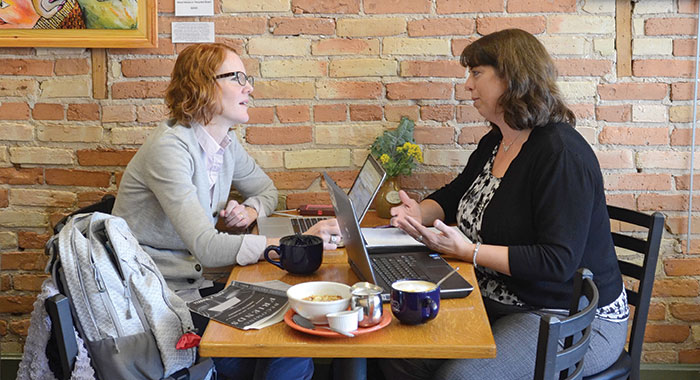Team Work
Astonished.
That’s how Julie Massey ’87 (Mission & Ministry) and Bridget Burke Ravizza (Religious Studies) describe feeling after talking with 50 married couples about their everyday holiness. They will share what they learned in their book “Project Holiness: Marriage as a Workshop for Everyday Saints.”
“We felt astonished a lot of times by the goodness of these people and the depth of their love for one another, and fidelity,” says Ravizza, who teaches a course on marriage and family as vocation. Massey says she “came away feeling really humbled by what other people are doing either in living out their faith, either in particular devotion practices or in the way they’re attentive to their spouse. There were some examples we encountered that were downright humbling.”
“They would talk about how good they are to each other,” Ravizza says, “the depth of their prayer life and what they do in the wider community. The kinds of service and hospitality that we heard about were really humbling but also inspirational.”
One thing they learned is that there’s no one-size-fits-all formula for a successful marriage, whether it’s prayer styles or going to bed angry. Some said never go to bed angry. Others said sometimes it takes more time, while trusting that they will deal with the problem later and are not just running from it.
Ravizza and Massey also speak of surprising insights couples have. For example, one woman, in discussing fidelity, said: “I could be better at being appreciative because I could take for granted what a good person my husband is and what he does for me,” Ravizza says. “That’s one thing I’ve thought about in my own marriage since we did that project.”
Both Ravizza and Massey are married with children and serve with their husbands in the FOCCUS pre-marriage education program in their parishes, working with engaged couples who have completed a 156-item inventory that assesses how each person looks at numerous issues.
The idea for the book sprang from a session on everyday holiness Ravizza attended in 2011 at the Catholic Theological Society of America conference. She asked Massey about co-writing a book “steeped in the experiences of couples and hearing how they talk about the holiness of their own relationships” and “how faith impacts their married and family life.”
Massey, who had written two articles on everyday holiness, says she believes “we need to be looking for opportunities to be living out holiness and to think about what we believe” in “the joy and the muck” of daily life.
“We had written a pair of articles for Liguorian magazine and so felt like we had an ability, that our writing styles were similar enough that we felt comfortable drafting and then critiquing each other and reworking drafts,” Massey says. “We felt like we were able to do that professionally and that our friendship was able to sustain that.
“And then,” she adds with a hearty laugh, “we were blessed with a lot of ignorance about how much work it is.”
Liturgical Press plans to publish the work in time for the World Meeting of Families, scheduled for Sept. 22-27, 2015, in Philadelphia. (At time of press, Pope Francis was expected to attend this event.)
The project began to take shape as they did background reading and determined how to gather information. They formed partnerships with 20 parishes in two Midwest dioceses. These parishes shared names of 105 couples, to whom they sent surveys in summer 2013; 150 of the 210 surveys were returned.
The parishes also introduced them to 50 couples, with some of whom they met from October 2013 to May 2014. In recorded two-hour focus groups, they spoke with 38 of the couples, two to four at a time, and with 12 more in 90-minute single-couple sessions. They asked questions and listened to the couples’ stories. The writing began in May.
Throughout the process, the co-authors continued their regular duties and continually assured each other that they were doing what they could, a day at a time.
Then their deadline was moved up a year to coincide with the family conference.
Fortunately, Ravizza was not scheduled to teach this past summer. And the college had recently instituted a staff sabbatical policy that allowed Massey to work half-days for eight weeks over the summer so that she could write during the rest of the day.
Massey says she’s grateful for that opportunity and for the support of her staff.
The project also matches Massey’s belief “that professional staff in colleges and universities should be involved actively in the life of the mind, that they should be reading, they should be writing, they should be presenting. We work in higher education, we should be scholars of our own sort.”
Ravizza, as a member of the teaching faculty, has a belief that complements her co-author’s. “I understand my job as a theologian is not to just serve the students – although obviously that’s a huge part of what it means to be a professor – but the wider church.”
“Project Holiness” will relate the stories and findings from the surveys and interviews in six chapters – friendship, sexuality, sacrament and ritual, service, suffering and fidelity – plus an introduction, appendix and conclusion. The authors see their audience as engaged couples, married people and church professionals, as well as college students studying marriage. They acknowledge that the work has a specifically Catholic focus and frame of reference.
As the writing phase ends, Massey and Ravizza talk about their gratitude to the couples, who, in offering their stories, not only spoke frankly and candidly about their marriages and children but also about their sense of responsibility for this gift. “They were willing to come and share just out of the goodness of their hearts. They were getting nothing out of it,” Ravizza says.
Nov. 13, 2014












